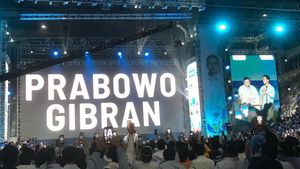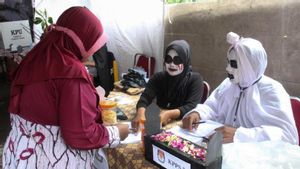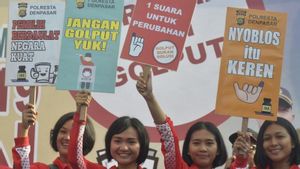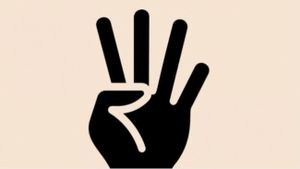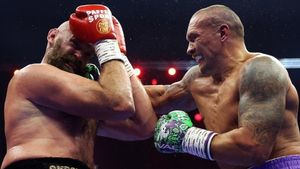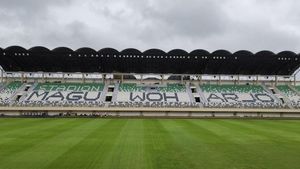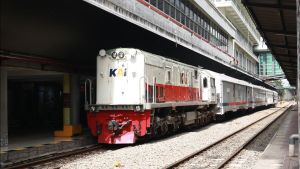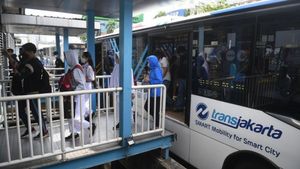JAKARTA - Former West Java Governor Ridwan Kamil made an upload on his Instagram account shortly after the quick count results were released by a number of Indonesian television stations. Through the results of a quick count in several survey institutions, the Prabowo Subianto-Gibran Rakabuming Raka pair outperformed Anies Baswedan-Muhaimin Iskandar and Ganjar Pranowo-Mahfud MD.
"Learning. Silent Majority has spoken," wrote Ridwan Kamil on his Instagram account.
'Who are they? 1. Those who listen but rarely comment, those who rarely make noise on social media every time this account posts #political, "he continued.
Jusuf Kalla also mentioned the term'silent majority' last month. The former Vice President discussed political conditions ahead of the 2024 General Election, which he said was the worst election ever in Indonesia.
At that time, Kalla mentioned intimidation so that the authorities were not neutral. According to him, the silent majority will move if pressure and injustice continue to occur.
Launching theCambridge Dictionary, silent majority is a large group of people who do not express their opinion about something or simply a large group of people in a country who do not express their opinions openly.
In Indonesian, the silent majority means a silent majority. Meanwhile, citing Kompas, silent majority means a group or society that does not actively participate in debates or demonstrations, but has a similar opinion or attitude.
The term "silent majority itself" according to the Political Dictionary was first used politically by Warren Harding in his 1919 campaign. The same term was popularized by former US President Richard Nixon in the 1960s.
Nixon used the term "silent majority" as a way to raise the spirits of voters who may not have voted because they were dissatisfied with the election. In his 1969 speech, Nixon used the term to attract a number of voters who supported him.
In the 2016 US election campaign, Donald Trump also used the term "silent majority" term. He used this term in a number of speeches and stated that the majority of those who remained silent had returned to support him.
In the election, the single group majority is claimed to have the power to determine the outcome of an election. Candidates who are able to withdraw support from the silent majority have the opportunity to win the election because they represent a silent majority vote.
Silent majority is also considered as a group that has a big influence on Joko Widodo-Ma's vote acquisition Ruf Amin in the 2019 presidential election. Like the current situation, at that time the results of quick calculations of various survey institutions showed Jokow-Ma'ruf winning over Prabowo Subianto-Sandiaga Uno's pair with a difference of votes from the two camps between 7 percent to 11 percent. Even though at that time, Jokowi's camp was also attacked by various hoax news and anti-Islamic accusations during the campaign.
According to observers from the Center for Community and Cultural Research from the Indonesian Institute of Sciences (PMB-LIPI) Wahyudi Akmaliah, the resistance of silent supporters or silent majoririty affected Jokowi-Ma'Ruf's victory.
"These hoaxes are widely circulated in WAG and they are very popular, on the one hand, supporters of the 02 (Prabowo) team are very militant and aggressive. And they continue to show it by usually sending material. This creates a kind of chaos among supporters 01 (Jokowi) and those who have not made a choice (swing voter), "said Wahyudi.
"The voters who know Jokowi's performance usually choose to listen (silent reader). And they show that feeling by increasing political participation. They reply in the booth at the TPS." he added.
According to Wahyudi, the resistance of the silent majority group is one of the characteristics of the character of the Indonesian people who do not really like open confrontation.
"This is indeed typical of Indonesians, especially Javanese people and several other cities, if they don't like being usually silent, don't want to face or argue directly," Wahyudi explained.
SEE ALSO:
For information, during the campaign period for the 2019 presidential election which lasted eight months, a series of hoaxes appeared on social media. The PoliticaWave Institute said Jokowi was the victim of the most political hoaxes and in the last presidential election, the 10 biggest hoaxes with the highest number of conversations on the internet all attacked Jokowi.
Among the hoaxes that attacked Jokowi included the issue of persecution of Ratna Sarumpaet, government debt from China, containers containing ballots, attacks on foreign labor to Jokowi accused the PKI of being anti-Islamic to the prohibition of the call to prayer.
The English, Chinese, Japanese, Arabic, and French versions are automatically generated by the AI. So there may still be inaccuracies in translating, please always see Indonesian as our main language. (system supported by DigitalSiber.id)



